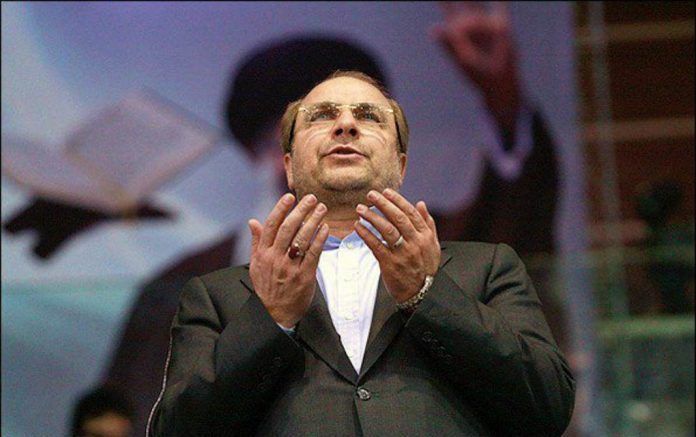By Parisa Hafezi
DUBAI, Feb 19 (Reuters) – Mohammad Baqer Qalibaf’s record as a Revolutionary Guards air force commander, a war veteran and a national police chief has endeared him to Iran’s supreme leader and boosted his chances of becoming the next speaker of parliament after Friday’s election.
Ayatollah Ali Khamenei, whose grip on power is being challenged by mounting pressure from Washington and by growing discontent at home, is seen by analysts as counting on security hawks like Qalibaf to form a loyal and compliant parliament.
The Guardian Council, a hardline body that vets candidates, has all but ensured the parliamentary vote will usher in a majority of Khamenei loyalists by disqualifying moderates and leading conservatives from standing.
“Today our problem is the economy and we need jihadi managers like Qalibaf to overcome economic problems,” Amirali Hajizadeh, head of the Guards aerospace unit, said in a strong video message of support posted on Iranian websites.
[aesop_image img=”https://kayhanlife.com/wp-content/uploads/2018/10/Sardar_Amir_Ali_Haji_Zade__Sardar_Hosein_Salami_by_Tasnimnews_02.jpg” panorama=”off” credit=”Amir Ali Hajizade.” align=”center” lightbox=”off” captionsrc=”custom” captionposition=”left” revealfx=”off” overlay_revealfx=”off”]
Iran Says Its Military Shot Down Ukrainian Passenger Plane in Error
The vote for the 290-seat assembly – the first since Washington quit an international nuclear pact with Iran and reimposed crippling sanctions – will test support for the clerical establishment ahead of presidential elections next year.
Qalibaf’s chances of becoming speaker hinge on gaining the trust of hardliners, who struggled for days to reach consensus on a single slate for Tehran. Hardliners could still nominate a rival as speaker in coming months.
“Hardliners are very divided … moderates and independent candidates will not vote for Qalibaf,” said a former reformist official on condition of anonymity. “It will be a very chaotic parliament with different groups of hardliners.”
A NO-NONSENSE CANDIDATE
Ahead of the election, Qalibaf has tried to win over middle- and lower-income voters by focusing on the economic hardships caused in large part by U.S. sanctions and by promising to tackle vested interests.
Some doubt that parliament is capable of bringing about change as Khamenei and the Revolutionary Guards determine the overall direction of the country by controlling the media, the armed forces, the intelligence services and most financial resources.
“Nothing can change under this establishment. It does not matter who wins this election,” said Ramin Sardari, 28, a jobless university graduate in Tehran.
Qalibaf, who ran unsuccessfully in two presidential races and was forced to drop out of a third to avoid splitting the hardline vote, has revived his political ambitions by standing for parliament.
In 2005, he resigned from the military to run for president. He was seen as a strong contender but lost in the final days when Khamenei and his allies switched allegiance to hardline populist Mahmoud Ahmadinejad.
Qalibaf went on to win Ahmadinejad’s job as mayor of Tehran, a post he held for 12 years. He won a reputation as a pragmatic problem-solver, tackling Tehran’s acute infrastructure crisis and improving public transport.
But the capital’s stubbornly chaotic traffic, his alleged involvement in a corruption case in 2016 and the deaths of 50 firefighters in a building collapse the next year damaged his popularity.
Despite that, many voters in Tehran still view the charismatic 58-year old, who leads the hardliners’ list of candidates for Tehran’s 30 parliamentary seats, as a no-nonsense candidate who can get the job done.
[aesop_image img=”https://kayhanlife.com/wp-content/uploads/2019/03/Jihad_Imad_Mughniah_in_General_Qasem_Soleimani_mothers_funeral04_.jpg” panorama=”off” credit=”FILE PHOTO: Ghasem Soleimani (R) and Mohammad Bagher Ghalibaf (L) shake hands at funeral for Ghasem Soleimani’s mother. Author: Hamed Malekpour. This file is licensed under the Creative Commons Attribution 4.0 International license. ” align=”center” lightbox=”off” captionsrc=”custom” captionposition=”left” revealfx=”off” overlay_revealfx=”off”]
TOUGH ON DISSENT
Qalibaf’s strong military credentials are expected to win over hardline candidates who share his background. At age 19, he first served in the 1980-88 Iran-Iraq war and quickly rose through the ranks, becoming a Guards general within three years and eventually commander of its air force in 1998.
A year later, when a bloody crackdown on protesting students precipitated nationwide unrest and forced the national chief of police to resign, Khamenei appointed Qalibaf to the post.
To civil rights activists and reformers he is known as someone who crushed protests and personally beat demonstrators in 1999, and also played an active role in repressing unrest in 2003.
Qalibaf was among a group of Guards commanders who sent a letter to then-president Mohammad Khatami, a reformist, threatening a coup unless he moved to end demonstrations.
In 2009, Qalibaf took credit as Tehran mayor for helping suppress months of bloody unrest that rocked the establishment after a presidential vote that opposition candidates said was rigged to secure Ahmadinejad’s re-election.
Qalibaf has however sometimes upset his anti-Western hardline backers.
He ran a flashy campaign in the 2005 presidential race, wearing a Western-style white linen suit and calling himself a “Hezbollahi Reza Shah” in reference to the father of Iran’s shah, who was toppled in the 1979 Islamic revolution.
(Writing by Parisa Hafezi; Editing by Giles Elgood)


